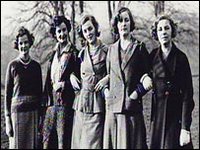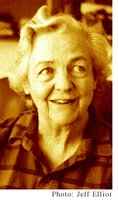
The Mitford Sisters
( Jessica is missing. The others are l-r Deborah, Nancy, Diana, Unity, Pamela)
The Mitford family has the dubious honor of having spawn one of the most eccentric groups of siblings ever. Between them, a famous novelist, two nazi sympathizers, a communist, a duchess and, less spectacularly, a homosexual and a horse-lover (not some sort of perversion, by the way).
I wasn’t aware that the Mitford sisters enjoyed such a cult until I read Atlantic magazine’s review of “Decca: The letters of Jessica Mitford”. But really, how can anyone not find them fascinating? Like the Beatles, everyone can have a favorite, only here you have seven to choose from.
I decided to start my forays in Mitford country trough “Hons and Rebels”, Jessica’s account of her childhood and teen years until her first marriage ended in untimely widowhood (she was 23).
First published in 1960 it is a very honest memoir. You might believe Jessica’s communism (and Diana and Unity’s Nazism, or even Nancy’s socialism) is first and foremost a rebellion against her parents and education, and she concedes as much in the end of “Hons and Rebels” when she attributes much of her (and her husband’s, Esmond Romilly, a nephew of Winston Churchill) teen to early twenties personality to it:
“Both Esmond and I would have scouted the idea that anything in our conduct was remotely attributable either to heredity or to upbringing, for, like most people, we regarded ourselves as “self-made”, free agents in every respect, the products of our own actions and decisions. Yet our style of behavior during much of our life together, the strong streak of delinquency which I found so attractive in Esmond and which struck such a responsive chord in me, his care-free intransigence, even his supreme self-confidence – a feeling of being able to walk unscathed through any flame – are not hard to trace to an English upper-class ancestry and upbringing”. Sure, some of the time you guess more than witness a certain obnoxiousness of character, but true-blue Jessica and Esmond were first and foremost completely clueless about the world. This provides funny episodes such as the author’s disbelief at meeting real working class brit girls, and finding them not only politically ignorant, but also disinterested, humorless and bitter, and the couples joyous sense of adventure in getting jobs such as sales-girl or stocking salesman, as if they were incredible explorations into some unknown world (which of course, it was). It could have swung either way, but in the end I joined their team. They wanted so much to experience life unencumbered by their familial values and prejudices, to make up their own minds about the world, their optimism is contagious, and yet Mitford never falls into a rosy discourse, which could have been so easy to achieve.
Just as riveting as the atmosphere of Swinbrook where the seven children grew up in near isolation, is Jessica Mitford’s account of the events leading up to Britain’s declaration of war on Germany. I was shocked to learn that it was, at one point, unclear whether Britain would join the war with or against the nazi regime, as well as the degree of cooperation Hitler enjoyed with prime-minister Neville Chamberlain’s government. And I was just as amazed to learn that as early as 1933 a book entitled “The Brown Book of the Hitler Terror” was published featuring photographs of the mistreatment of jewish prisoners.
You can’t help but empathize with Jessica Mitford’s puzzlement at her favorite, and once closest, sister, Unity (nicknamed Boud) endorsement of nazi doctrine. Part of adult life is, to my mind, often about little moments of alarm, when you realize you have a less than clear idea of who exactly your siblings, your parents and childhood friends are.
You’d have to be a cold fish indeed, to conclude “Hons and Rebels” and not wish to follow deeper and further into the history of these very unusual sisters and brother. Yes, it’s voyeuristic, but ultimately they only have themselves to blame – they’re just so damned interesting. In the parlance of those times – terrific.

Jessica Mitford
No comments:
Post a Comment